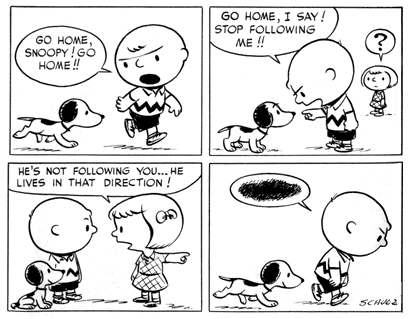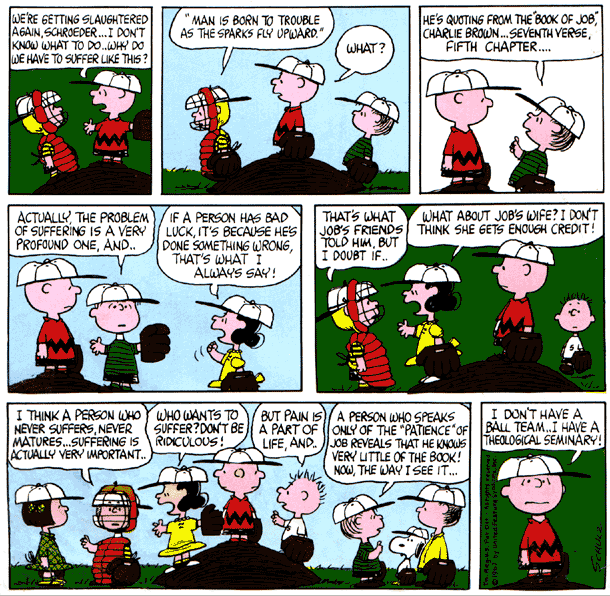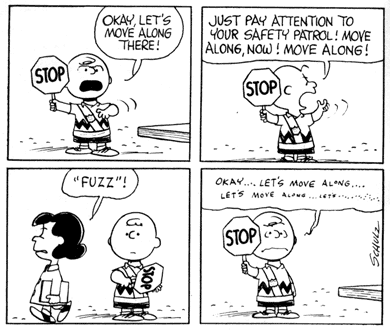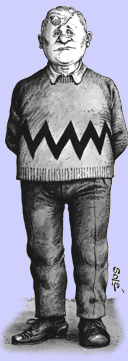

| December 2003 |
|
| Charles Schulz : Peanuts | |
 Like most of today's spoiled youth, you with your fancy sneakers and your Sailor Shogun Final Fantasm and your Rage Against the Ween, you probably think of Peanuts as the mascots for Met Life and Hallmark Cards, inexplicably given a shakily drawn comic strip which never even approaches droll.
Like most of today's spoiled youth, you with your fancy sneakers and your Sailor Shogun Final Fantasm and your Rage Against the Ween, you probably think of Peanuts as the mascots for Met Life and Hallmark Cards, inexplicably given a shakily drawn comic strip which never even approaches droll.
The main reason for this is that you simply missed the party. Peanuts was brilliant for about twenty years, from 1955 on. (What happened then? We'll get to that.)
More: Peanuts was so brilliant that it simply took over. Like its contemporary, Mad, it changed the way pop culture works. It looks ordinary in retrospect because now everything looks like Peanuts.
Schulz's main innovation was to take the kid's eye view seriously. It's not that this was never done before (it was Mark Twain's early stock in trade), but despite the prevailing anarchy of early 20C comics, kids were almost always seen from the outside, whether as monsters (the Katzenjammer Kids) or as decorations in strips centering on adults. Even Little Nemo made little attempt to understand kids, rather than simply amuse them-- McCay remembers childhood nightmares, but not kids' day-to-day preoccupations.
Schulz got into the heads of the kids-- even took their physical viewpoint, close to the ground. Adults were never seen, only occasionally heard. And what was in the kids' heads turned out to be fear, worry, cruelty, ambition, fantasy, fear of failure. Peanuts is an existentialist rumination hiding as a gag comic. Much of the the time the prevailing atmosphere isn't comedy but anxiety. Linus and his blanket and his perpetually disappointing personal religion, Peppermint Patty and her troubles with schoolwork, Charlie Brown and everything-- all are frankly neurotic. Even Lucy, the neighborhood tyrant, suffers from an unrequited crush on Schroeder.
 Of course, the kids are preternaturally articulate, and this too has been so widely adopted that it doesn't register as an innovation when you read the strip. If you've enjoyed Calvin and Hobbes you're enjoying classic Peanuts at a remove. Calvin's dysfunctional relationship with almost everyone (parents, teachers, kids next door) i s basically taken from Schulz; so is the frequent surrealism and abrupt comedowns (down to specific borrowings like the unlikely but hilarious snow sculptures, or a busybody spoiling a fantasy of crawling across the desert by bringing a drink).
Of course, the kids are preternaturally articulate, and this too has been so widely adopted that it doesn't register as an innovation when you read the strip. If you've enjoyed Calvin and Hobbes you're enjoying classic Peanuts at a remove. Calvin's dysfunctional relationship with almost everyone (parents, teachers, kids next door) i s basically taken from Schulz; so is the frequent surrealism and abrupt comedowns (down to specific borrowings like the unlikely but hilarious snow sculptures, or a busybody spoiling a fantasy of crawling across the desert by bringing a drink).
At the right is an example of Peanuts in its heyday (from 1967). The first thing to notice is that the strip isn't terribly funny. Schulz is rarely funny the way Mad or Sam & Max is. The metajoke is more original: not any of the lines in themselves, but the fact that a theological discussion is breaking out in the middle of a kids' baseball game (and in the middle of the comics page).
The second thing to notice is that it's a pretty good discussion. Every comment is reasonable and well-informed; it's not a fake or pastiche religious discussion but a real one.
Next, all the comments are in character. Linus is the intellectual, geeky enough to provide the chapter and verse citation, but knowledgeable enough to critique conventional wisdom (his point about Job's patience is a good one; Job actually spends almost all of the book railing against God). Schroeder (and 5) express mature though mainstream points of view. Lucy is the voice of self-righteous 'common sense'; still, she's given perhaps the best line in the strip; it's the sort of out-in-left-field yet valid observation which is a mark of Schulz. She's right; Job's wife suffered everything he did, and didn't even have the dignity of being a subject of God's and Satan's wager.
 Another example, at left. Again, it's not boffo; the joke, if that's what it is, is how quickly Charlie Brown is deflated from self-importance into his usual loserdom. Along the way we may note more hallmarks of Schulz's style: a fascination with trendy words and catch phrases, and his very expressive line: with minimal strokes he expresses Charlie's officiousness and despair, and Lucy's quiet disdain.
Another example, at left. Again, it's not boffo; the joke, if that's what it is, is how quickly Charlie Brown is deflated from self-importance into his usual loserdom. Along the way we may note more hallmarks of Schulz's style: a fascination with trendy words and catch phrases, and his very expressive line: with minimal strokes he expresses Charlie's officiousness and despair, and Lucy's quiet disdain.
The minimalism is a reminder of Schulz's inadvertant dark legacy: one of the selling points of the early strip was that it was tiny-- an inducement to editors, in a time when the average comic extended across the whole page. Within a couple of decades all comics had shrunk to the size of Peanuts. There was no more room for beautiful drawings and expansive stories; everything was gag strips and stylized, easily registered caricatures. It's not Schulz's fault exactly, but his mastery of the form encouraged imitation.
Lucy's appropriation of a term belonging to the student protesters is not untypical; throughout the golden age Schulz effortlessly remained in communication with the Boomers without being one of them (he was born in 1922). Like Bugs Bunny, Peanuts appealed to everyone, irregardless of age or politics: the conventional found it conventionally amusing; the radical found that it expressed their rebellion on a deeper level. We can see this in the sample: are Schulz's sympathies with Charlie Brown here or with Lucy? Is Charlie Brown enjoying a rare moment of self-confidence, or simply demonstrating that power corrupts? It's balanced on a knife-edge.
 Gary Groth conducted a very awkward interview with Schulz in the Comics Journal, which established what different mental worlds they each lived in. Groth keeps dropping names that a card-carrying intellectual should know, and Schulz keeps cheerfully answering that he knows nothing about them. It's a nice demonstration of the universality of Peanuts versus the particularity of Schulz-- a very decent guy whose idea of a good time was a really open-ended Bible study.
Gary Groth conducted a very awkward interview with Schulz in the Comics Journal, which established what different mental worlds they each lived in. Groth keeps dropping names that a card-carrying intellectual should know, and Schulz keeps cheerfully answering that he knows nothing about them. It's a nice demonstration of the universality of Peanuts versus the particularity of Schulz-- a very decent guy whose idea of a good time was a really open-ended Bible study.
Heck, even the French loved him-- at right is an illustration by Solé from Monsieur Schulz et ses Peanuts, a 1976 volume with a respectful essay on the strip, with chapter titles like "Existence as a field of struggle and experience", accompanied by satirical hommages from a pantheon of French cartoonists. (The one who best captured the spirit of Schulz was one Rampal; e.g. he has Lucy shrieking, "It's horrible! The French have published a book on us! They analyze us, dissect us, psychoanalyze us, put us in question... believe me, America is in danger!" Linus asks, "What are the French?" "A tribe in Europe, I think," says Charlie Brown.)
So, what happened? I have a Peanuts book from 1999; leafing through it, it's recognizably from the same mind, and it's certainly not coasting on stale gags like Garfield and his lasagna; but it's pretty much lost its edge. (Typical gag: Peppermint Patty's paper is put in the "D-Minus Hall of Fame"-- and the joke is dragged out over four days). Perhaps there's a clue in the Groth interview: Schulz mentions that he'd never do some of the early strips again; he found them too cruel. But the genius of the strip lay in its very cruelty; it's as if Dante had decided to write a tour of Heck. As well, Schulz no longer seemed very much in touch... the characters still seem like Boomer kids of the '50s. (Who plays marbles anymore? What kids actually organize their own baseball games? Do teachers still make them write reports on the Nile?)
